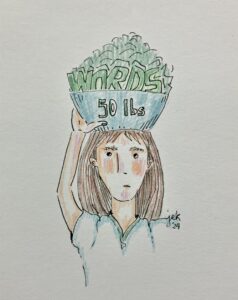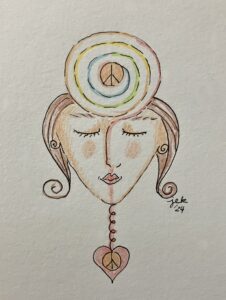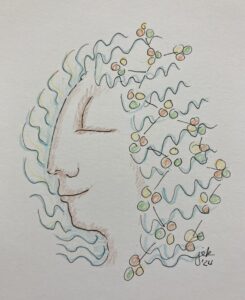The nagual shaman, don Juan Matus, explained to his apprentice, Carlos Castaneda, that yes, the solid object reality we live in is indeed real, but, it is energy first. Our thoughts, which are interpretations of energy, manifest our physical reality.
What we manifest is real, but the broader truth is that all manifested realities are but an interpretation of infinite energy. Like the Hindu image of the cosmic ocean, the wave is but the manifested surface that appears, and then disappears, back into its underlying cosmic oneness.
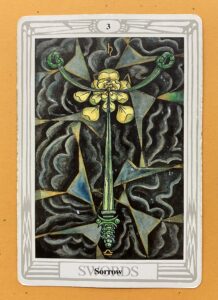
Aleister Crowley, in discussing the Three of Swords, in his Thoth tarot deck, states that the extreme sorrow of this card can be likened to the Buddha’s initial stage of enlightenment when he encountered the pure potential of unmanifested reality: no forms, no reason.
Despite the bliss of this pure clarity, there is the necessary sorrow of releasing attachment to the familiar. Here, one is challenged to surrender to a consciousness greater than one’s current manifestation.
It all begins in the mind. Outer reflects inner. It’s all in what one chooses to emphasize. Negative thought is certainly an option; it’s just as real an option as a positive thought—divinity includes everything.
Everything is possible, but the paradox is that to realize this truth we must be willing to let go of our cherished beliefs, which are fixations of energy that block the natural flow of energy needed to manifest desired change. The struggle is indeed one of submitting to enlightened sorrow, the necessary crossroad that accompanies moving beyond the familiar habitual self.
Take for instance a desired physical change in the body. One may state a healing intent of change but is constantly assaulted by the feedback of sensory evidence that contradicts one’s stated suggestion to their subconscious mind. This sensory feedback loop becomes its own internal dialogue that presents a more powerful counter-intention to the subconscious mind.
The technology of change, through the use of autosuggestion, insists that one emphasize repeatedly that their desired change is already accomplished. The seed has been planted in the divine substance of the subconscious mind and its full manifestation cannot be stopped, despite the presence of a solid sensory artifact, rooted in a prior interpretation of energy.
I suggest resting the body so that the subconscious mind, relieved of its physical oversight responsibilities, might clearly receive its new directive and move toward manifestation. With presence and passion, repeat the stated intention. Be bold, no hesitation, thy will is done.
At other times, be willing to suffer those moments of fear and sorrow when one glimpses the real possibility of letting go of the cherished limited self. Yes, you are chosen; you have chosen to emphasize the red pill: the life-changing, often painful truth beyond the current fixation of solid energy.
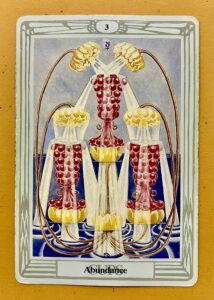
Of course, when the gig is up, the gig is up. In another card of Crowley’s Thoth tarot deck, the Three of Cups, we find the near perfect realization of the manifested intent of abundance. The presence of pomegranate seeds in the cups, though symbolic of abundance, also recall Persephone’s required stay in the underworld for six months of the year with her husband Pluto, god of the dead.
We cannot escape the expiration date located in the small print of every manifestation. Life insists upon growth, which always requires the letting go of the known.
This recalls the Buddha’s suggestion that life is suffering. Everything that we attach to ultimately limits our growth. But that sorrow can be sweet when we embrace love for all in this adventure of forever. One always has the choice to emphasize love and let it fully manifest.
With love,
Chuck

